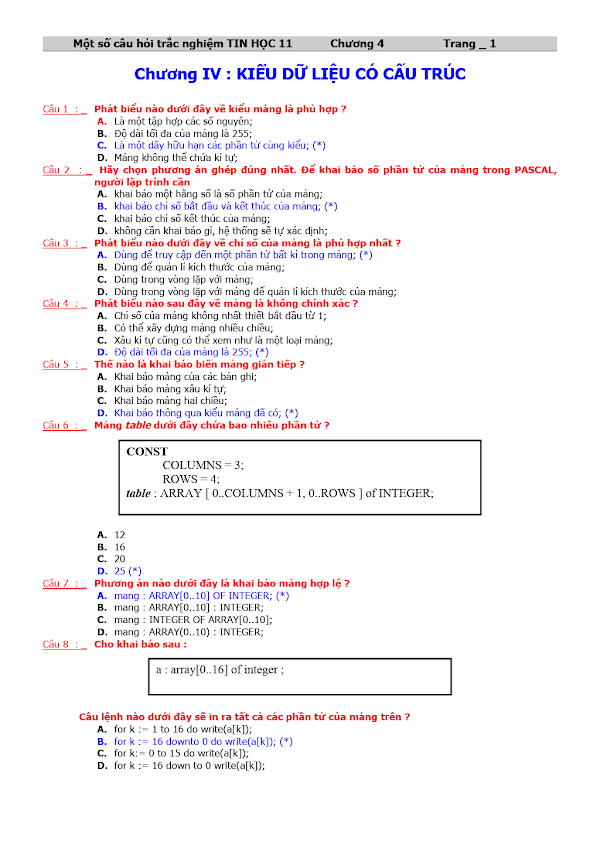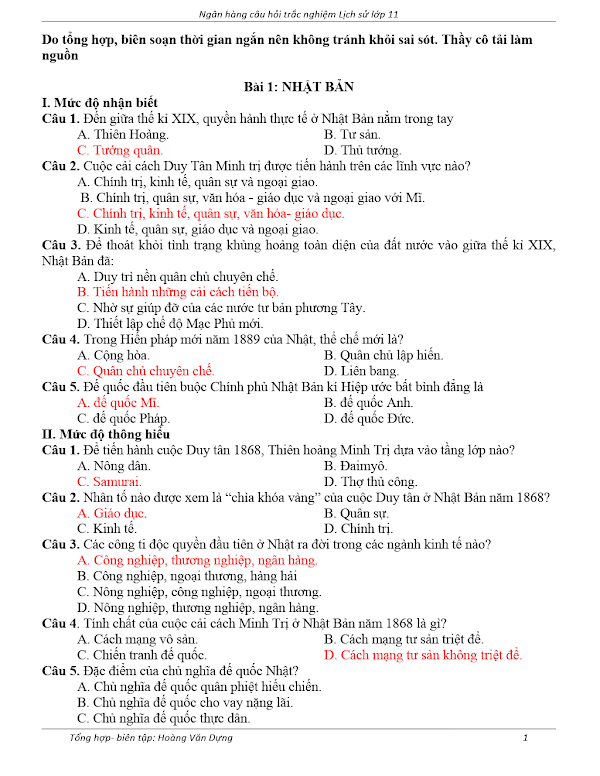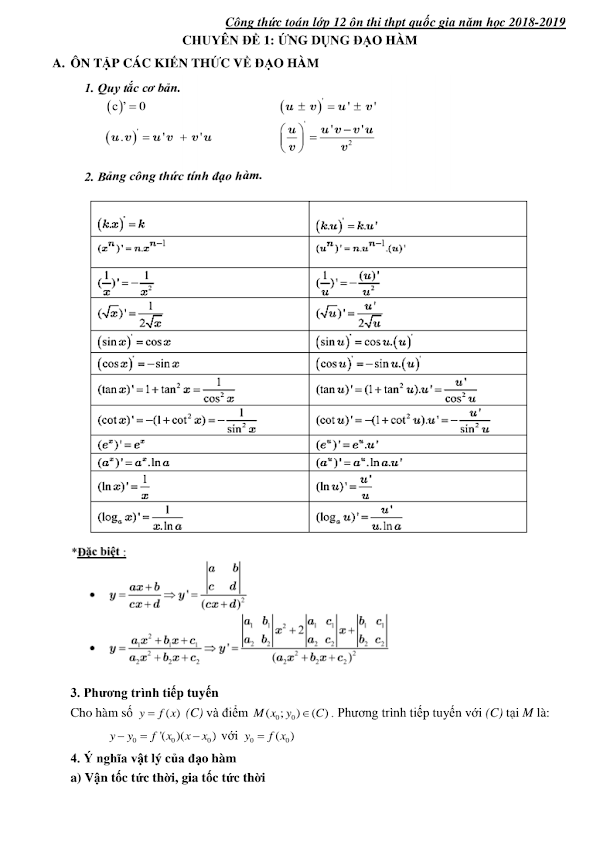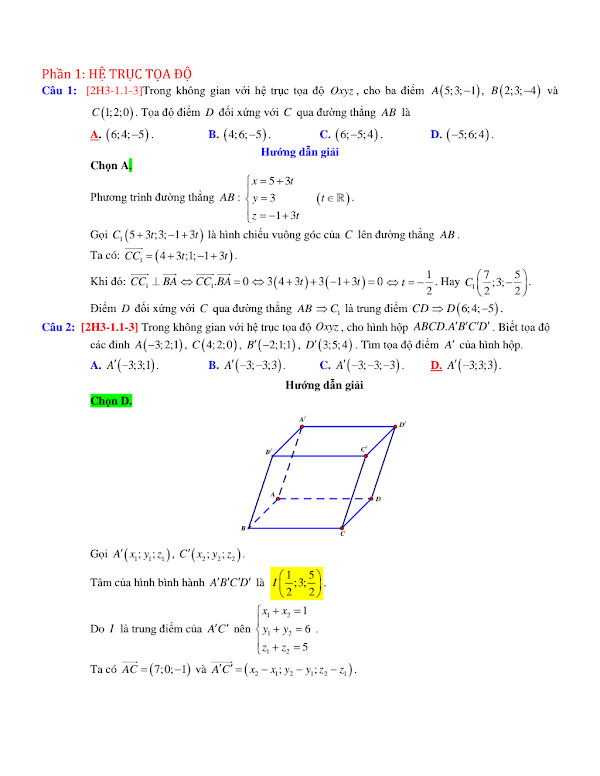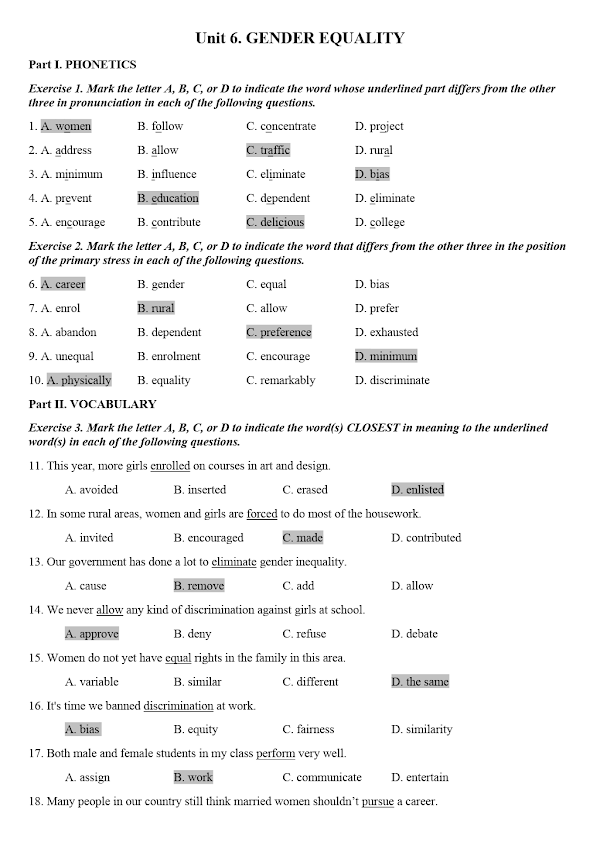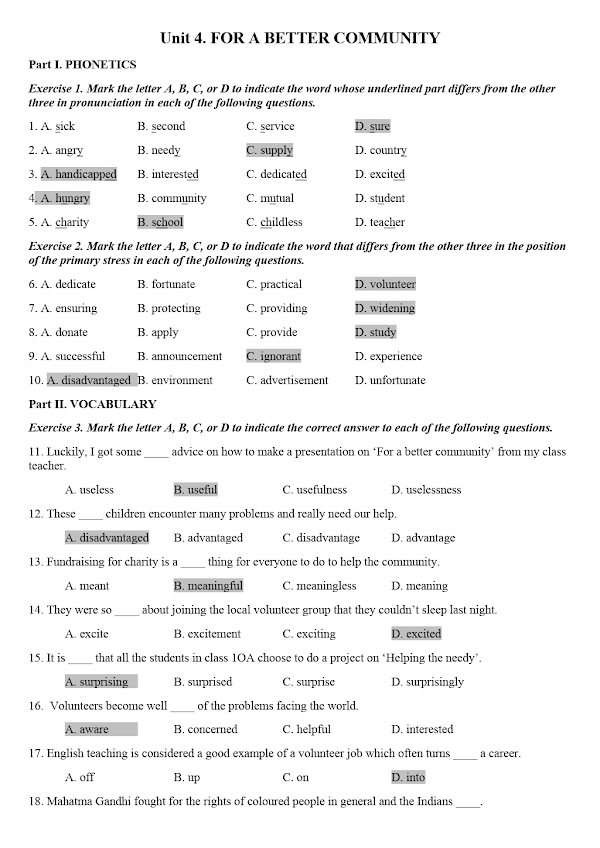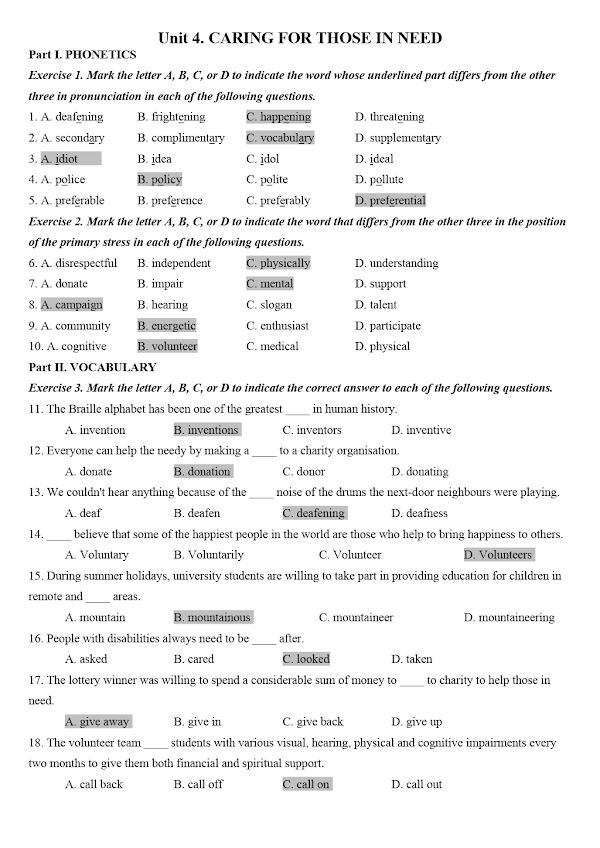Đề thi thử THPTQG năm 2020 môn Tiếng Anh (có đáp án chi tiết)
Chào các bạn học sinh và quý thầy cô, hôm nay LogaVN gửi tới bạn đọc tài liệu "Đề thi thử THPTQG năm 2020 môn Tiếng Anh (có đáp án chi tiết)". Hi vọng sẽ giúp ích cho các bạn học tập và giảng dạy.
ĐỀ THI THỬ THPTQG NĂM 2020
CHUẨN CẤU TRÚC CỦA BỘ GIÁO DỤC
Môn thi: TIẾNG ANH
Thời gian làm bài: 60 phút, không kể thời gian phát đề
Họ, tên thí sinh:
Số báo danh:
Mark the letter A, B, C, or D to indicate the word whose underlined part differs from the other three in pronunciation in each of the following questions.
Question 1: A. believes B. dreams C. girls D. parents
Question 2: A. nature B. manage C. balance D. campfire
Mark the letter A, B, C, or D to indicate the word that differs from the other three in the position of the primary stress in each of the following questions.
Question 3: A. suggest B. involve C. travel D. sustain
Question 4: A. disappear B. arrangement C. opponent D. contractual
Mark the letter A, B, C or D to indicate the correct answer to each of the following questions.
Question 5: Nobody phoned while I was out, _________?
A. wasn’t I B. was I C. did they D. didn’t they
Question 6. I want to introduce you to Sharon. She is _____ very nice person.
A. a B. an C. the D. Ø
Question 7. Would you like to go shopping ______ Sunday morning?
A. of B. about C. at D. on
Question 8: She made as if ____________ but then stopped.
A. to speak B. speaking C. spoken D. speak
Question 9: If we _____ the local people to hunt endangered species for our consumption, they would become extinct sooner.
A. allow B. would allow C. were to allow D. were allowed
Question 10: She has been waiting for this opportunity since she ______from university.
A. had graduated B. graduated C. has graduated D. graduates
Question 11: ________ Jack has a new car, he no longer takes the commuter train to work every day.
A. Because B. Because of C. As a result D. Although
ĐỀ MINH HỌA SỐ 55 – Hằng 18
THEO HƯỚNG TINH GIẢN BÁM SÁT ĐỀ MINH HỌA 2020ĐỀ THI THỬ THPTQG NĂM 2020
CHUẨN CẤU TRÚC CỦA BỘ GIÁO DỤC
Môn thi: TIẾNG ANH
Thời gian làm bài: 60 phút, không kể thời gian phát đềHọ, tên thí sinh:
Số báo danh:
Mark the letter A, B, C, or D to indicate the word whose underlined part differs from the other three in pronunciation in each of the following questions.
Question 1: A. believes B. dreams C. girls D. parents
Question 2: A. nature B. manage C. balance D. campfire
Mark the letter A, B, C, or D to indicate the word that differs from the other three in the position of the primary stress in each of the following questions.
Question 3: A. suggest B. involve C. travel D. sustain
Question 4: A. disappear B. arrangement C. opponent D. contractual
Mark the letter A, B, C or D to indicate the correct answer to each of the following questions.
Question 5: Nobody phoned while I was out, _________?
A. wasn’t I B. was I C. did they D. didn’t they
Question 6. I want to introduce you to Sharon. She is _____ very nice person.
A. a B. an C. the D. Ø
Question 7. Would you like to go shopping ______ Sunday morning?
A. of B. about C. at D. on
Question 8: She made as if ____________ but then stopped.
A. to speak B. speaking C. spoken D. speak
Question 9: If we _____ the local people to hunt endangered species for our consumption, they would become extinct sooner.
A. allow B. would allow C. were to allow D. were allowed
Question 10: She has been waiting for this opportunity since she ______from university.
A. had graduated B. graduated C. has graduated D. graduates
Question 11: ________ Jack has a new car, he no longer takes the commuter train to work every day.
A. Because B. Because of C. As a result D. Although
Question 12: ____ his homework, he will surf the social networks.
A. At the time he finished B. After he had finished
C. After he has finished D. By the time he was finishing
Question 13: Scientists ____ on the site found many ancient tools, tombs and pottery, and made some important archaeological discoveries.
A. worked B. working C. to work D. to be working
Question 14: We will create a stable, prosperous and highly ____ ASEAN Economic community.
A. compete B. competition C. competitor D. competitive
Question 15: The United States, China and India are now competing for political influence in ASEAN, and France, a leading European country, does not want to be ___________.
A. left out B. put off C. thought of D. led on
Question 16: Ian has no difficulty in ____ into use the perfect plans his friends have prepared for him.
A. lending B. taking C. putting D. heading
Question 17: Action movies may have a negative _________ on children.
A. opinion B. influence C. dependence D. decision
Question 18: All the applicants for the post are thoroughly ________ for their suitability.
A. searched B. vetted C. investigated D. scrutinized
Question 19: Parents are always willing to lend a sympathetic ________ to their children when they have problems.
A. hand B. ear C. eye D. paw
Mark the letter A, B, C or D to indicate the word(s) CLOSEST in meaning to the underlined word(s) in each of the following questions.
Question 20: Ha Long Bay has attracted millions of visitors who come to enjoy its breathtaking views and experience other activities.
A. unbreathable B. heartbreaking C. awe-inspiring D. unforgettable
Question 21: In spite of poverty and dreadful conditions, they still manage to keep their self-respect.
A. self-reliant B. self-restraint C. self-esteem D. self-assured
Mark the letter A, B, C or D to indicate the word(s) OPPOSITE in meaning to the underlined word(s) in each of the following questions.
Question 22: Her graceful performance of this traditional art form in the evening session was a real source of pleasure.
A. attractive B. effortless C. inelegant D. sophisticated
Question 23: Nam is considered to be the best student in our class because he's not only good at learning but also well-informed about everything around the world.
A. perfectly-informed B. badly-informed
C. bad-informed D. ill-informed
Mark the letter A, B, C, or D on your answer sheet to indicate the sentence that best completes each of the following exchanges
Question 24: A custom officer is talking to a client at the airport.
- Officer: “Welcome. Can I see your ticket, please? “
- Client: “___________________”
A. Yes, here you are. B. Can you tell me how to get to gate A22?
C. Thank you for all your help. D. Can I have a seat near the emergency exit?
Question 25: Two friends are talking with each other about a musical concert.
- A: “Hey, there is a musical concert in the park. Do you want to go seeing the band play?”
- B: “___________________.”
A. How long ago did the band start playing at our park?
B. I am done with my homework; I can go.
C. Oh, I like all kinds of music as long as it is not Hard Rock.
D. My favorite is Rock and Roll music.
Read the following passage and mark the letter A, B, C, or D on your answer sheet to indicate the correct word or phrase that best fits each of the numbered blanks.
Despite the wealth of information campaigns telling people about global warming and its causes, (26) _______ people have yet to realize how severe the problem is. Coming climate changes could alter as much as one third of plant and animal habitats by the end of the 22nd century. These changes could in turn cause widespread extinctions among plant and animal species around the globe.
Coastal and island habitats are perhaps in the greatest danger (27) _______ they face the combined threats of warming oceans and rising sea levels. As habitats change, many animals will come under intense pressure to find more suitable homes for themselves. Mass (28)_______ of at least some animals are certainly to be expected, but the fact remains that many animals will simply not be able to move fast enough.
Such dire predictions may sound alarmist, but they are based on the rather moderate estimate that the amount of carbon dioxide in the atmosphere will double by 2100. Many scientists believe, however, (29)_______ this figure is actually very conservative, and they claim that a tripling is far more realistic. If they are (30) ____, the effects on nature will be even more dramatic.
(Source: https://www.nytimes.com/interactive/2017/climate)
Câu 26: A. almost B. most C. most of D. many of
Câu 27. A. although B. providing C. since D. therefore
Câu 28. A. migrations B. onslaught C. emigration D. extinctions
Câu 29: A. that B. which C. when D. whether
Câu 30. A. precise B. true C. exact D. correct
Read the following passage and mark the letter A, B, C, or D on your answer sheet to indicate the correct answer to each of the questions.
In “How many hours does it take to make a friend?” (2018), Jeffrey A. Hall describes the types of encounters that build a friendship.
His study found that hours of time spent together was linked with closer friendships, as was time spent enjoying leisure activities together. Specifically, he found that the chance of making a “casual friend,” as opposed to a mere acquaintance, was greater than 50 percent when people spent approximately 43 hours together within three weeks of meeting. He further found that casual friends evolve into friends at some point between 57 hours after three weeks, and 164 hours over three months. Hall's research also demonstrated, however, that when it comes to time spent developing friendships, quality is more important than quantity. And when it comes to conversation, topics matter. When it comes to building quality relationships, the duration of conversation is not as important as the content. Meaningful conversation is the key to bonding with others.
Hall found that when it comes to developing friendships, sharing daily life through catching up and joking around promotes closeness; small talk does not. Consider the inane topics that often come up when you are trapped in an elevator with an acquaintance. Discussing the weather or speculating on how many stops you will make before finally reaching the lobby does not facilitate bonding. Nor does mere proximity. Hall found that obligatory time spent together, such as in a classroom or workplace, does not promote closeness. Friendships require an efficient use of time together. Someone who remembers the details of your life and asks questions about your family, your job, your latest vacation, etc., is much more likely on his or her way to becoming someone you consider a friend, as opposed to an acquaintance.
(source: https://www.psychologytoday.com/)
Question 31. Which best serves as the title for the passage?
A. The priceless gift of time B. The cluttered social life
C. A world of online acquaintances. D. From best friends to acquaintances.
Question 32. The word “he” in paragraph 2 refers to _______.
A. classmate B. friend C. acquaintance D. Jeffrey
Question 33. According to paragraph 2, what conclusion can be drawn from the finding of Jeffrey A. Hall?
A. Constant contact exhausting, the pressure to be positive all day long is draining.
B. Even in our fast-paced world, you can create friendships that truly last a lifetime.
C. Both quantity and quality of time spent together contribute to spark true friendships.
D. Individuals are motivated to engage in conversations that form and strengthen relationships. Question 34. The word “inane” in paragraph 3 is closest in meaning to ______.
A. silly B. small C. regular D. normal
Question 35. According to paragraph 3, what kind of setting can foster real amity?
A. High-fiving with a stranger on the street. B. Travelling with your friend on holiday.
C. Boarding the same lift as your neighbor. D. Discussing with classmate for the class project.
Read the following passage and mark the letter A, B, C, or D on your answer sheet to indicate the correct answer to each of the questions.
For hundreds of years, giving flowers have been a social means of communication. In the United States, flowers are often given during rites of passage, for commemorating special occasions or as a heartfelt gift between loved ones and friends. Flower gifting also occurs in most countries around the world. However, the meanings and traditions often vary.
While students traditionally gave their favorite teacher an apple in past years, in China, teachers are given flowers. Peonies are by far the flower most often given in China. They are also quite popularly used for weddings. Strangely, potted plants are not considered a pleasant gift among Asian cultures. The people believe that like a plant confined by a pot, the gift symbolizes a binding or restriction.
In Russia, in lieu of giving birthday presents, the guest of honor receives a single flower or an unwrapped bouquet. Floral arrangements or baskets are not given. Russians celebrate a holiday known as Woman’s Day. Traditional gifts include red roses, hyacinths or tulips. When there is a funeral or other occasion where someone wishes to express sympathy, carnations, lilies or roses are given in circular configurations, which signify the transition of birth, life and death to rebirth. In this instance, the color of choice is commonly yellow. For joyous occasions, arrangements and bouquets generally contain an odd number of flowers.
In the times of ancient Rome, brides carried flowers to scare away evil spirits and encourage fertility. The Dutch believed that flowers were food for the soul. When invited to someone’s home in Great Britain, it is tradition to bring a gift of flowers. All types are acceptable except white lilies, which are usually seen at funerals. Not unlike the United States, red roses are a symbol of love. Flowers are generally gifted in odd numbered increments regardless of the occasion. However, the Brits also have superstitions regarding the number 13, so the number is avoided.
In the southern region of the continent, flowers are traditionally given during Christmas. Egyptians are much more conservative and restrict flower gifting to funerals and weddings. While certain flowers may have significant meanings for some, flowers in Las Vegas and across the United States flowers are an accepted gift for any reason desired.
(Source: http://www.flowersofthefieldlv.com/ )
Question 36. What does the topic mainly discuss?
A. The fascinating tradition of giving flowers.
B. The different meaning of flowers in different cultures.
C. The comparison of giving flowers between Asian and European cultures.
D. The kinds of flowers people often give others in different cultures.
Question 37. What does the word “They” in paragraph 2 refer to?
A. Students B. Teachers C. Flowers D. Peonies
Question 38. Why should not you give a potted plant to an Asian?
A. Because the Asian prefer to be given flowers.
B. As this gift is often given at weddings in Asia.
C. Since this gift is believed to symbolize a binding and limitation in Asia.
D. Because the Asian students like to give an apple or flowers to others.
Question 39. According to the passage, the following flowers are given at Woman’s Day in Russia, EXCEPT ___________.
A. red roses B. hyacinths C. tulips D. yellow roses
Question 40. What could the word “fertility” in paragraph 4 best be replaced by?
A. fecundity B. good spirit C. happiness D. loyalty
Question 41. The word “superstitions” in paragraph 4 is closest in meaning to __________.
A. deep-seated belief B. unfounded belief C. religious belief D. traditional belief
Question 42. It can be inferred from the passage that ____________.
A. People can give flowers to the American in any occasion.
B. Egyptians are rather comfortable when receiving flowers at funerals and weddings.
C. Flowers given in Britain are in even numbers in any case.
D. At the funerals in any cultures, flowers are gifted in circular configurations.
Mark the letter A, B, C, or D on your answer sheet to indicate the underlined part that needs correction in each of the following questions.
Question 43: The introduction of the new species of plants into PhuQuoc island offer an opportunity to study the response of a natural system to stress.
A. new species B. plants C. offer D. response
Question 44: A big wedding requires a lot of preparation, such as sending invitations, hiring costumes and choose dishes.
A. requires B. preparation C. sending invitations D. choose
Question 45: Thanks to artificial intelligence, the phone's voice-recognition system converts the sound into numerous data.
A. Thanks to B. voice-recognition C. converts D. numerous
Mark the letter A, B, C, or D on your answer sheet to indicate the sentence that is closest in meaning to each of the following questions
Question 46: The kitchen is bigger than the living room.
A. The living room is bigger than the kitchen
B. The kitchen is smaller than the living room.
C. The living room isn't as big as the kitchen.
D. The kitchen is not bigger than the living room.
Question 47: “We can go to the airport by taxi this morning”, they said.
A. They said they could go to the airport by taxi that morning
B. They said they can go to the airport by taxi that moring
C. They said we can go to the airport by taxi this morning
D. They said we could go to the airport by taxi that morning.
Question 48: You are advised to choose your travel provider on the basis of their eco principles and practices before your departure.
A. You should choose your travel provider on the basis of their eco principles and practices before you go.
B. You are obliged to choose your travel provider on the basis of their eco principles and practices before your departure.
C. You are required to choose your travel provider on the basis of their eco principles and practices before your departure.
D. You have to choose your travel provider on the basis of their eco principles and practices before your departure.
Mark the letter A, B, C, or D on your answer sheet to indicate the sentence that best combines each pair of sentences in the following questions
Question 49: Don’t forget to revise the lesson carefully. You will be confident to do the test.
A. You will be confident to do the test unless you revise the lesson carefully.
B. You will be confident to do the test if you don’t revise the lesson carefully.
C. You will not be confident to do the test in case you revise the lesson carefully.
D. You will be confident to do the test if you revise the lesson carefully.
Question 50: These international students were bored with the book on local architecture. They couldn’t finish reading it
A. Not until these international students finished reading the book on local architecture did they find it boring.
B. But for the boredom of the book on local architecture, these international students could finish reading it.
C. So boring was the book on local architecture that these international students couldn’t finish reading it.
D. No matter how boring the book on local architecture was, these international students could finish reading it
Hơn 100 đề bám sát đề MH lần 1,2 của bộ QUÝ THẦY CÔ MUỐN CHIA SẺ
LH : ko chín tám hai năm ko ba hai ko hai
MA TRẬN
SttDạng bàiKiến thứcSố câu1Phonetic-s ending1Vowel12Stress Two-syllable verb1Three-syllable word with special ending1
3
Grammar & vocabularyTag question 1Article 1Preposition 1Verb form 1Conditional sentence (conditional Type 2)1Conjunction 1Verb tense
- past tense
- Present perfect tense in adverbial clause of time2Relative clause (Reduced relative clause with Ving)1Word formation1Phrasal verb1Word choice/collocation3Idiom (word choice in idiom)14Synonym
Vocabulary 25AntonymVocabulary26Language functionLanguage function2
7
Clozed reading testExpression of quantity1Word choice2Relative pronoun1Conjunction1
8
Reading 1Main idea1Detail2Reference1Vocabulary 1
9
Reading 2Main idea1Vocabulary 2True/false information1Reference1Ask for detail1Inference1
10Error identificationS-V agreement1Parallel structure1Confusing word 1
11
Sentence transformationComparison 1Reported speech 1Modal verb (+bare V)1
12Sentence combinationConditional sentence 1Inversion1
Hơn 100 đề bám sát đề MH lần 1,2 của bộ QUÝ THẦY CÔ MUỐN CHIA SẺ
LH : ko chín tám hai năm ko ba hai ko hai
ĐÁP ÁN
12345678910DACACADACB11121314151617181920ACBDACBBBC21222324252627282930CCDABBCAAD31323334353637383940ADCABADCDA41424344454647484950BACDDCAADC
Mark the letter A, B, C, or D to indicate the word whose underlined part differs from the other three in pronunciation in each of the following questions.
Câu 1: Đáp án D
D. /s/
Các đáp án còn lại /z/
Câu 2: Đáp án A /ˈneɪtʃə(r)/
B. /ˈmænɪdʒ/
C. /ˈmænɪdʒ/
D. /ˈkæmpfaɪə(r)/
Mark the letter A, B, C, or D to indicate the word that differs from the other three in the position of the primary stress in each of the following questions.
Câu 3: Đáp án C (Động từ 2 âm tiết có đuôi –el thì trọng âm rơi vào âm 1
Các từ còn lại trọng âm rơi vào âm 2
Question 4: Đáp án A
- disappear /ˌdɪsəˈpɪə(r)/ (v): biến mất
- arrangement /əˈreɪndʒmənt/ (n): sự sắp xếp
- opponent /əˈpəʊnənt/ (n): đối thủ, kẻ thù
- contractual /kənˈtræktʃuəl/ (adj): bằng hợp đồng
Mark the letter A, B, C or D to indicate the correct answer to each of the following questions.
Câu 5: Đáp án C
- Với chủ ngữ là everybody, everyone, somebody, someone, nobody, no one chúng ta dùng đại từ “they” trong phần câu hỏi đuôi
- Nobody” mang nghĩa phủ định nên phần hỏi đuôi dùng khẳng định
- Vế trước ở thể khẳng định của thì quá khứ đơn nên phần hỏi đuôi dùng trợ động từ “did”
Dịch: Không ai gọi điện khi tôi ra ngoài phải không?
Câu 6: Đáp án A
Đi với danh từ khô

